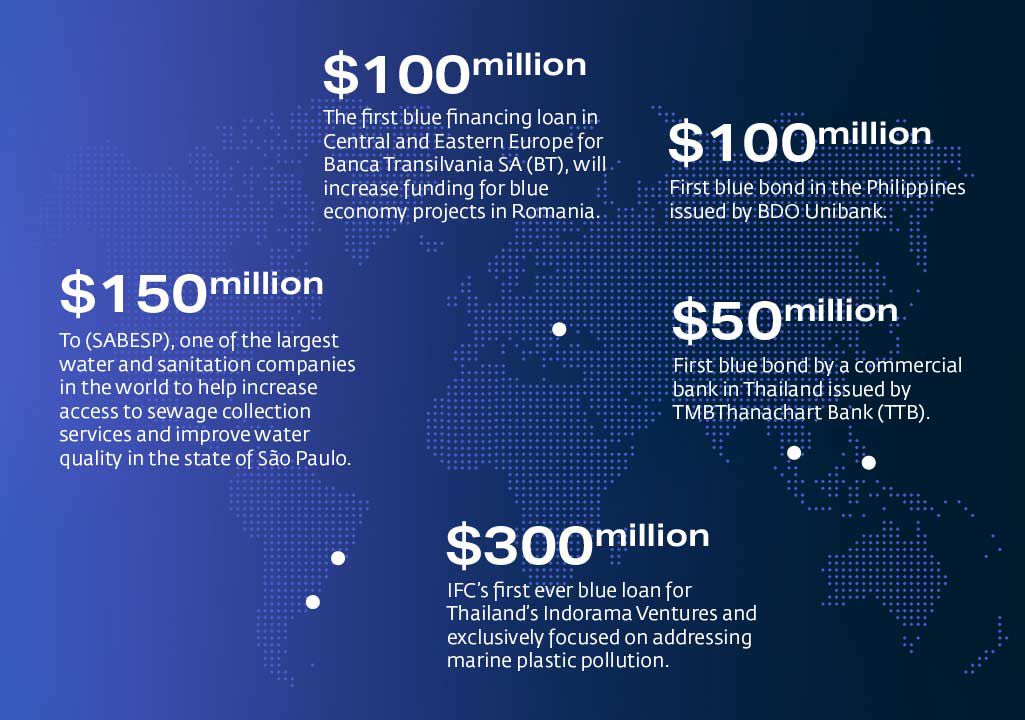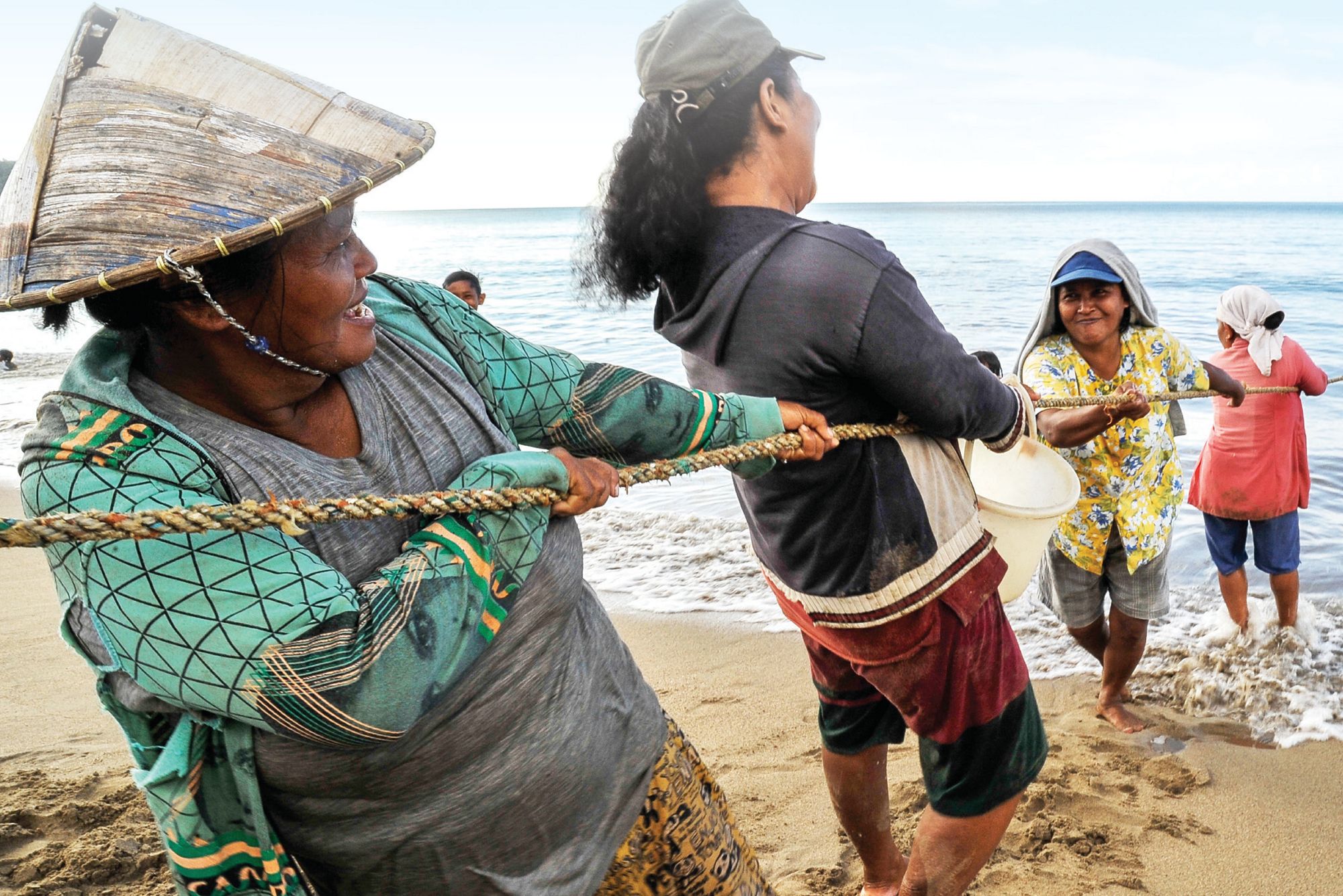Waterways and oceans are critical for human existence and a cornerstone of the global economy. The financial and private sector has a critical role to play in pivoting the global economic system towards preserving and increasing clean water resources, rebuilding ocean prosperity, restoring biodiversity, and regenerating ocean health.
IFC is well positioned to be the partner of choice to create a viable blue finance market. IFC has established itself as a global leader in the green bond market and has been transformative in setting precedents in benchmark issuances, currency diversification, and impact reporting. IFC is now extending this experience from green to blue and is targeting to scale blue finance in next few years.
What is Blue Finance?
Blue finance is an emerging area in climate finance with increased interest from investors, financial institutions, and issuers globally. It offers tremendous opportunities to help safeguard our access to clean water, protect underwater environments and invest in a sustainable water economy. Specifically, Blue Bonds and Blue Loans are innovative financing instruments that raise and earmark funds for investments such as water and wastewater management, reducing ocean plastic pollution, marine ecosystem restoration, sustainable shipping, eco-friendly tourism, or offshore renewable energy.
IFC recognizes the untapped potential for its clients to grow their blue financing products and services. IFC is working with financial institution clients, partners, other development finance institutions, corporates, to develop a systematic global blue economy finance market.
Since 2020, IFC has provided more than $1.4 billion dollars in blue loans and bonds to private sector financial institutions and corporates, for example to boost recycling and reduce marine plastic pollution in Africa and Asia.
IFC continues to lead on blue finance, for example, by facilitating the first Blue Bonds issued in the EAP region and helping countries adopt blue finance. In the Philippines, where marine plastics are a key issue threatening several elements of the country public economy, IFC subscribed up to $100 million in the first blue bond issued by BDO Unibank Inc.—the largest bank in the Philippines and the first in the East Asia Pacific (EAP) region.
In Thailand, IFC mobilized and anchored a $300 million blue loan for Indorama Ventures and supported the country's first blue bond issued by TMBThanachart Bank Public Company Limited (ttb), making them the first commercial bank in to issue this type of bond.
IFC also issued the first blue financing loan in Central and Eastern Europe to increase funding for blue economy projects in Romania. The landmark €100 million loan has been provided by IFC for Banca Transilvania SA (BT), the largest bank in the country. In Turkiye, we provided a $120 million blue and green loan to Yapı Kredi Leasing, a leading Turkish leasing company that will help increase access to climate finance for small businesses in areas such as climate mitigation and adaptation financing.
In the fall of 2022, IFC made two pioneer commitments in Latin American blue finance: IFC supported a $150 million loan to Companhia de Saneamento Basico de Estado de Sao Paulo (SABESP) to improve water quality and expand sewage collection and treatment in the poorest neighborhoods, which will reduce pollution of the Pinheiros River and we also announced a $40 million agreement with Banco Internacional to support the first private-sector blue bond in Ecuador and Latin America. Since then, we've continued to invest in Latin America, announcing Colombia's first blue bond, and most recently a sustainable loan of $160 million to Produbanco to support the blue economy in Ecuador. Ahead of COP 28, we announced a new blue bond strategy with T. Rowe Price to enhance a sustainable blue economy for emerging markets. We are currently exploring blue economy market opportunities in Africa.
Blue bonds and blue loans have not yet adopted and implemented industry standards and guidelines. The market has been seeking guidance on project eligibility criteria, translating general blue economy financing principles into guidelines for blue bond issuances and blue lending.
In the early part of 2022, IFC published Guidelines for Blue Financeto provide advice on blue project eligibility criteria; blue issuances; and blue lending in line with ICMA’s Green Bond Principles and Green Loan Principles and SDG 6 and 14. And in 2023, IFC released a paper titled Blue Carbon Finance in Coastal Ecosystems. These standard-setting documents are not only helping guide IFC’s investments to support the blue economy. They offer practical guidance to financial institutions for investing in blue carbon projects and blue finance, with a view to helping unlock trillions of dollars in the ocean economy.
At the UN Ocean Conference in Lisbon, a working group of five international organizations committed to launch global guidance on blue bonds. Earlier this year, IFC, ADB, UNEP FI, UN Global Compact, and ICMA developed a comprehensive global practitioner's guidance on blue bonds to build investor confidence and catalyze investments that protect our oceans and the marine ecosystem, in line with SDG 14.




